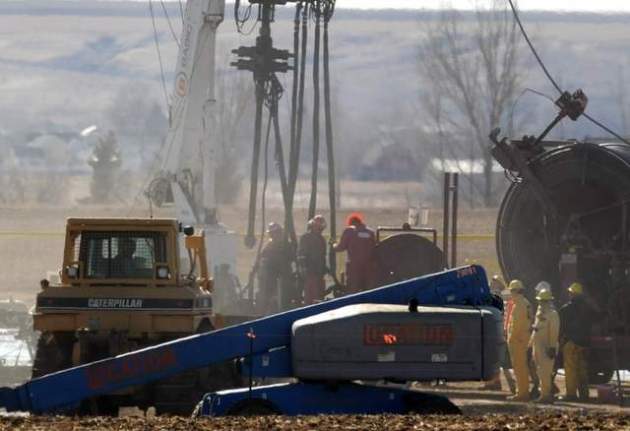This 30 minute video posted by PBS illustrates well the conversation that take place between both sides. It also shows some of the rhetoric that both of the sides use. I would advise watching this video if you would like to see how these sides interact in a public setting
Month: December 2013
Updates
Today, the Grand Junction Chamber of Commerce met with the Colorado Oil and Gas association -who represent over 300 energy companies in the state- to talk about bans on hydraulic fracturing. In the future there could be a statewide vote to ban fracking which is piggy backing off of the four regions in Colorado that have banned it so far.
Doug Flanders, The Colorado Oil and Gas director had this to say. “It’s not surprising that you would have passed that [ban] in the city of Boulder. They haven’t seen a well since 1999. It’s a symbolic vote saying we don’t like oil and gas. It has nothing to do with hydraulic fracturing,” said Colorado Oil and Gas director of policy Doug Flanders.
This statement is running off of a stereotype that Mr. Flanders has against Boulder County. Our townspeople voted from their own judgement and not simply from environmentalist rhetoric that floats around the city. Since the price of living here has gone up so much, we are seeing more conservative people in Boulder and I have seen more right wing bumper stickers than ever before and our votes on other matters prove that. If someone does not support oil and gas they most likely will not be for the fracturing, but even if they are that doesn’t mean they will not vote against it as well.
Pros and Cons
In the media we seem to only hear one argument from each side on the battle of hydraulic fracturing. I wanted to go into some details about what the pros and cons are from each side so that the public can make form educated ideas and take part in productive and informed arguments. The energy potential for shale gas is hard to deny. In 2000 shale gas represented 1 percent of the natural gas supply and today that number is 30 percent and rising. The US department estimated the number of recoverable barrels of gas at around 1.3 trillion. Saudi arabia is at 2.6 trillion. In 2012 this energy boom supported 2.1 million jobs and added 75 billion dollars to federal and state revenue. Our oil and gas proaction are at record highs and household income has been raised by $1,200. Hydraulic fracturing is going to help us get off of foreign oil and become self reliant.
Those who are against fracking believe that the potential cost outweigh the benefits. In the fracking process chemicals are used that people are worried are going to get into the infrastructure. The process also releases methane gas into the atmosphere which is one of the most harmful greenhouse gases.The wells need harmful wastes to be trucked in and out regularly. There are some communities that have reported their faucet water as being flammable. A small town in Ohio reported an earthquake that registered a 4.0 in an area that is not known for earthquakes but where there is fracking. That is another concern, the seismic activity that may occur.
Colorado Fracking Site Flooding
This video was created by the environmental activist group Earth First. Though they are extreme in their views this video is a comprehensive look at what floods and hydraulic fracturing sites can create.
Lawsuits
In recent posts it was said that certain companies were filing lawsuits against cities that had banned tracking in Colorado. The Colorado Oil & Gas Association (COGA) filed lawsuits against a few cities putting into question the validity of the bans. This association argues that these cities don’t have the authority to implement these regulations on oil and gas techniques. The COGA says that it is in the best interest of the state to “foster the responsible and balanced development, production, and utilization of the natural resources of oil and gas in Colorado in a manner consistent with protection of public health, safety, and welfare, including protection of the environment and wildlife resources.”
The COGA claims that the regulations voted in by it’s citizens go against state laws regulating natural resources. They say that they are the one with the exclusive authority to regulate wells within the state. These lawsuits do not surprise me and I don’t think they surprise anyone who really knows the situation. We are going to have to keep a watch on these trials. I could see something like this heading to the supreme court.
Welcome
The Hydraulic Fracturing industry, or fracking, is a hotly contested issue in our state of Colorado right now. One side says that fracking is key to economic growth and success while the other says that it will cause major environmental issues. Five other states have already enacted the regulation of fracking which are California, Ohio, Pennsylvania, Utah, and Wyoming. Alaska will be considering legislation. In Colorado, Fort Collins, Boulder, Broomfield, and Layfayette have all either banned or created moratoriums on hydraulic fracturing. Broomfield recently had a recount of votes and the five year ban on fracking was only passed by 20 votes. Even though these towns have passed bans, polls show that more than half of registered voters in the state of Colorado support hydraulic fracturing.
A legal battle is brewing between the cities of Colorado that have banned the controversial gas drilling and the oil and gas industry. The companies are raising questions about whether local governments with the support of residents can lawfully prohibit their practice of hydraulic fracturing. All of this information shows how divided the state is on this issue. The stakes are high in this issue, and there is a lot of money to be made or lost. In the rest of my posts I will be delving into these topics in detail and others.